Newsletter December 2017
 ICRH Global Newsletter ICRH Global Newsletter 15th of December, 2017
|
| Celebrating International Safe Abortion Day in Mozambique ICRH-Mozambique held an event on 28th September together with the Rede DSR (Sexual and Reproductive Rights Coalition), to commemorate International Safe Abortion Day.  The event was held in a secondary school in Marracuene district to coincide with a Contraception Fair during which information and services were provided to students about family planning, HIV, and gender-based violence, along with information about the recent legislation that decriminalizes safe abortion. Although the law was passed in 2014, free safe abortion services are not yet widely available, and most women and girls are not aware of the legislation change. The event was held in a secondary school in Marracuene district to coincide with a Contraception Fair during which information and services were provided to students about family planning, HIV, and gender-based violence, along with information about the recent legislation that decriminalizes safe abortion. Although the law was passed in 2014, free safe abortion services are not yet widely available, and most women and girls are not aware of the legislation change. |
| ANSER week 2017 From 27 November until 1 December 2017, the members of the Academic Network for Sexual and Reproductive Health and Rights Policy (ANSER) met in Ghent, Belgium for a week full of events. 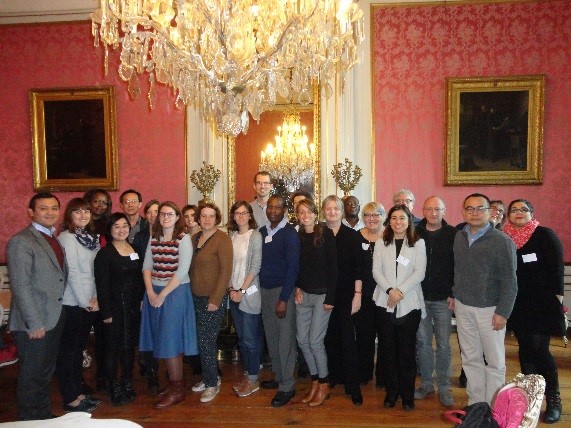 The well-filled programme consisted of among others a seminar on EU-China collaboration, a seminar on ‘the glass wall between SRHR science and policy’, workshops on joint publications and joint projects, a video training session, a session on LGBTIQ and access to health, and a General Assembly. At the latter, five new members were welcomed, which brings the total number of ANSER members at 29. During the ANSER week, plans were made to among others submit joint project proposals, publish policy briefs, develop online training modules, organize staff exchanges and set up workshops, trainings and events. More information: anser@ugent.be The well-filled programme consisted of among others a seminar on EU-China collaboration, a seminar on ‘the glass wall between SRHR science and policy’, workshops on joint publications and joint projects, a video training session, a session on LGBTIQ and access to health, and a General Assembly. At the latter, five new members were welcomed, which brings the total number of ANSER members at 29. During the ANSER week, plans were made to among others submit joint project proposals, publish policy briefs, develop online training modules, organize staff exchanges and set up workshops, trainings and events. More information: anser@ugent.be |
| Xiamen City Delegation visits ICRH On November 16, a delegation from Xiamen City, Fujian province visited ICRH.  The delegation was led by Wei Xiaomeng, vice executive president of the Family Planning Association of Xiamen city. Members included including Zhang Minghe (Maternal and Child Health Hospital), Lin Qiaozhi (Women's Hospital party secretary, vice president), Xie Qingping, director of the office and deputy secretary of the Xiamen Municipal Family Planning Association, and Ms. Chen mingfen. The event was chaired by Professor Zhang Weihong (ICRH) and two ICRH visiting fellows, Steven Zhang from Wuhan University of Science and Technology and Janet Wu from Renji Hospital, Affiliated to Shanghai Jiao Tong University School of Medicine participated in the meeting. The delegation was led by Wei Xiaomeng, vice executive president of the Family Planning Association of Xiamen city. Members included including Zhang Minghe (Maternal and Child Health Hospital), Lin Qiaozhi (Women's Hospital party secretary, vice president), Xie Qingping, director of the office and deputy secretary of the Xiamen Municipal Family Planning Association, and Ms. Chen mingfen. The event was chaired by Professor Zhang Weihong (ICRH) and two ICRH visiting fellows, Steven Zhang from Wuhan University of Science and Technology and Janet Wu from Renji Hospital, Affiliated to Shanghai Jiao Tong University School of Medicine participated in the meeting.The purpose of the visit was to explore cooperation possibilities in the fields of sexual education for adolescents, preconception care, exchange of staff, regular meetings of Obstetrics and Gynaecology, and the introduction of overseas talents to Chinese hospitals. |
| UNESCO Chair label for ICRH Kenya On 20 November 2017 ICRH Kenya and the Coast General Hospital (CPGH) in Mombasa were awarded the Label of the UNESCO Chair in Sexual Health and Human Rights from the University of Paris Diderot for the Gender Based Violence and Recovery Centre (GBVRC). 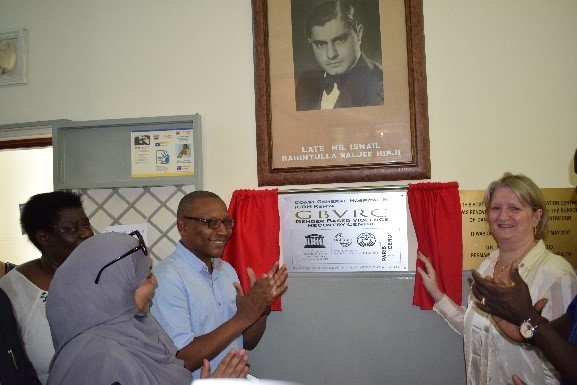 The award ceremony event was graced by the presence of among others the Deputy Governor, Mombasa County, representatives from UNFPA and The award ceremony event was graced by the presence of among others the Deputy Governor, Mombasa County, representatives from UNFPA andUNESCO, and staff and board members of ICRH and CPGH. The mission of the UNESCO Chair in Sexual Health and Human rights is to promote the development, understanding and well-being of individuals, couples and families as regards sexual health. The Label recognizes efforts of organizations in promoting sexual health and human rights in challenging settings. The GBVRC was established in 2007 as a collaboration between Coast General Hospital, the Municipality of Mombasa and ICRH Kenya. The centre was initially supported through a grant from the Danish International Development Agency (DANIDA). Between 2008 and 2012, the centre was supported through personal grants from Prof. Marleen Temmerman. Thereafter, funding was obtained through a grant from UNFPA. Over the last decade, more than 7,000 survivors have received care at the centre. More than half the survivors are girls aged 17 years and below. The centre has full-time clinical staff who provide 24-hour clinical and psychosocial services to post-rape victims.The clinical staff are supported by paralegals who provide legal support and follow-up to the victims and coordinate the process of ensuring perpetrators are brought to justice. The GBVRC also provides training and mentorship on SGBV management to staff at the Coast County Hospital and other hospitals within Mombasa Municipality. |
Collaboration with stakeholders for sustainable development This was the topic of a workshop organised by the Flemish University Council (VLIR) Institutional University Cooperation (IUC) at Moi University, Kenya from 6 to 9 December. The objectives of the workshop were to provide a forum for stakeholders and researchers to explore opportunities available for sustainable development and appraise the capacity built by the VLIR-UOS programme and the overall potential that Moi University has in harnessing future opportunities through sustainable collaborative networks. The workshops brought together donors, stakeholders, policy makers and researchers. Several topics, including health sciences, were addressed. This was the topic of a workshop organised by the Flemish University Council (VLIR) Institutional University Cooperation (IUC) at Moi University, Kenya from 6 to 9 December. The objectives of the workshop were to provide a forum for stakeholders and researchers to explore opportunities available for sustainable development and appraise the capacity built by the VLIR-UOS programme and the overall potential that Moi University has in harnessing future opportunities through sustainable collaborative networks. The workshops brought together donors, stakeholders, policy makers and researchers. Several topics, including health sciences, were addressed. |
| ICRH Mozambique and the Global Gag Rule ICRH-Mozambique featured in Al Jazeera documentary on the impact of the Global Gag Rule  A recent documentary for Al Jazeera’s People and Power series features ICRH-Mozambique as part of its assessment of the impact of the US Administration’s “Protecting Life in Global Health Assistance” policy (People and Power: Trump and the Ethics of Foreign Aid). The documentary investigates the impact that the policy is having in Mozambique in particular, where safe abortion has been decriminalized and organisations such as ICRH-M are facing the possible loss of US funding as a consequence of refusing to sign the Global Gag Rule. A recent documentary for Al Jazeera’s People and Power series features ICRH-Mozambique as part of its assessment of the impact of the US Administration’s “Protecting Life in Global Health Assistance” policy (People and Power: Trump and the Ethics of Foreign Aid). The documentary investigates the impact that the policy is having in Mozambique in particular, where safe abortion has been decriminalized and organisations such as ICRH-M are facing the possible loss of US funding as a consequence of refusing to sign the Global Gag Rule. |
| 16 Days of Activism against Gender-Based Violence Campaign During these days, ICRH Belgium contributed to two important events. On November 28, The European Forum to Build Bridges on Female Genital Mutilation was organized in Brussels by END FGM European Network in cooperation with DG JUST and DG DEVCO of the European Commission. The forum was an excellent opportunity to share experiences, exchange good practices and discuss future trends, and gathered NGOs, CSOs, service providers and practitioners, donors, researchers, experts, lawyers, academics, civil servants and activists from Europe, Africa, the USA, Iraq, India, and UN organisations. The programme was shaped around the 4 Ps approach of the Istanbul Convention (Prevention, Protection, Prosecution, Integrated Policies) and explored how to strengthen cooperation between different regions of the world, particularly with regard to cooperation with countries of origin in Africa and Asia; between different sectors and how to foster actions that address various forms of violence against women and girls through a holistic approach. The Forum came up with a set of recommendations on building bridges. ICRH Prof. Els Leye appeared on the panel regarding Building Bridges between Sectors, where she provided insights on the role of academics in promoting interaction and collaboration between stakeholders. The event was livestreamed to Facebook and can be viewed here: facebook.com/endfgmeuropeannetwork Prof. Leye was also an invited expert to the Experience-sharing meeting ‘Improving data collection on female genital mutilation in the European Union’, organized by the European Institute for Gender Equality, on the 6th of December 2017 in Brussels. The meeting aimed to discuss the availability, reliability and comparability of data to measure the risk of female genital mutilation in the EU Member States, and drafted recommendations on reducing the risk. Prof Leye gave a presentation ‘Lessons learned from FGM prevalence and risk estimations in Belgium’. |
| EU-China Health Forum The first EU-China Health Forum was held n 27 November in Brussels and focused on reproductive health. 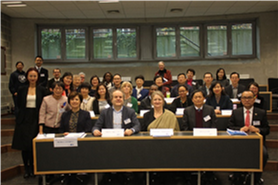 The Forum was co-organised by ANSER, Université Libre de Bruxelles (ULB) and ICRH Belgium. At the opening session, Prof. Yvon Englert, Rector of ULB welcomed the participants. Keynote speakers and Invited guests included, Mr. She Long, Counsellor for Science and Technology at the Chinese Embassy to the Kingdom of Belgium; Mrs. Rosanna D'AMARIO, Senior Expert at the Health Directorate of DG Research & Innovation Unit; Mrs. HAN Jianli, First Secretary for Science and Technology at the Mission of the People's Republic of China to the European Union on behalf of Dr. WANG Yan, Minister Counsellor of Science and Technology at the Mission of the People's Republic of China to the European Union; Prof. Marleen Temmerman and Prof. Jan De Maeseneer. The forum was very productive and successful in sharing expertise and discussing ideas for new collaboration. The second EU-China Health Forum will be held between the 28-30 May 2018 in Beijing, China. The Forum was co-organised by ANSER, Université Libre de Bruxelles (ULB) and ICRH Belgium. At the opening session, Prof. Yvon Englert, Rector of ULB welcomed the participants. Keynote speakers and Invited guests included, Mr. She Long, Counsellor for Science and Technology at the Chinese Embassy to the Kingdom of Belgium; Mrs. Rosanna D'AMARIO, Senior Expert at the Health Directorate of DG Research & Innovation Unit; Mrs. HAN Jianli, First Secretary for Science and Technology at the Mission of the People's Republic of China to the European Union on behalf of Dr. WANG Yan, Minister Counsellor of Science and Technology at the Mission of the People's Republic of China to the European Union; Prof. Marleen Temmerman and Prof. Jan De Maeseneer. The forum was very productive and successful in sharing expertise and discussing ideas for new collaboration. The second EU-China Health Forum will be held between the 28-30 May 2018 in Beijing, China. |
| ICRH PEOPLE |
Zhiyong Zhang Zhiyong Zhang came to ICRH UGent Belgium as a collaborate researcher from Institute of Labor Economics affiliated to Wuhan University of Science and Technology, Wuhan, Hubei Province, China. Zhiyong Zhang came to ICRH UGent Belgium as a collaborate researcher from Institute of Labor Economics affiliated to Wuhan University of Science and Technology, Wuhan, Hubei Province, China.Zhiyong is staying at ICRH from November 2017 to January 2018. He is a professor in his domestic university. He has already got his PhD in 2006 and completed postdoctoral research in 2010. He has been interested in employment, rural migrant worker, overwork, health economics and etc. Supported by Chinese National Social Science Fund, he came to Gent and intends to perform activities related to the project ‘work women occupational stress’, supervised by ICRH senior researcher dr. Wei-Hong Zhang. More information: Zhiyong.Zhang@UGent.be |
Anna Galle wins best presentation award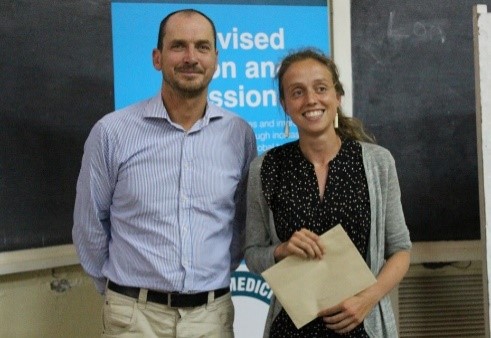 ICRH researcher Anna Galle won an award for ‘best presentation’ at the East African Research in Progress 2017 meeting in October 2017 in Tanzania. ICRH researcher Anna Galle won an award for ‘best presentation’ at the East African Research in Progress 2017 meeting in October 2017 in Tanzania.‘Research in Progress’ is a collaboration between RSTMH, The East African Diploma in Tropical Medicine & Hygiene (EADTMH), the London School of Hygiene and Tropical Medicine (LSHTM), KCMC and the Medical Association of Tanzania. The idea behind ‘Research in Progress’ is to give students and early career researchers and professionals an opportunity to present unpublished research in progress through short oral presentations and posters. Anna Galle won an award for her presentation on male involvement in maternal health in Southern Mozambique. All abstract that were presented at the conference can be downloaded from the website of RSTMH: https://rstmh.org/sites/default/files/files/2017%20RSTMH%20Abstract%20Book.pdf |
Marc Arbyn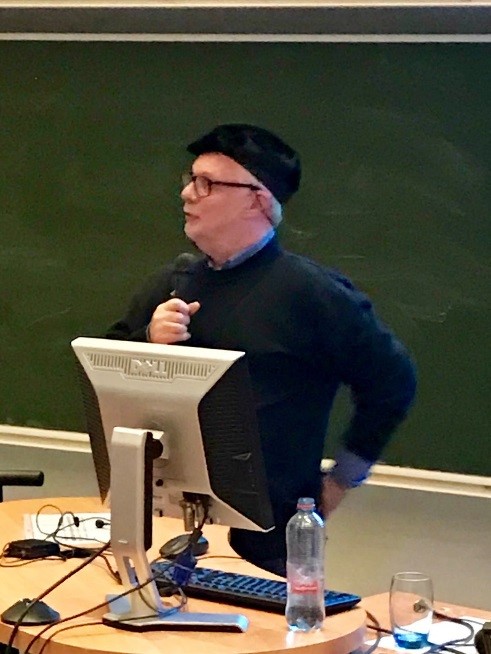 Marc Arbyn defended his PhD thesis on 13 November 2017 in Ghent, Belgium. Marc Arbyn defended his PhD thesis on 13 November 2017 in Ghent, Belgium.The title of the thesis is ‘Evidence regarding Human Papillomavirus Testing in Secondary Prevention of Cervical Cancer’. Supervisors were Prof. dr. Marleen Temmerman, Prof. dr. Steven Weyers, Prof. dr. John Paul Bogers. The full thesis can be downloaded from the ICRH website: http://icrhb.org/publication/icrh-monograph-marc-arbyn-evidence-regarding-human-papillomavirus-testing-secondary |
Rhoune Adhiambo Ochako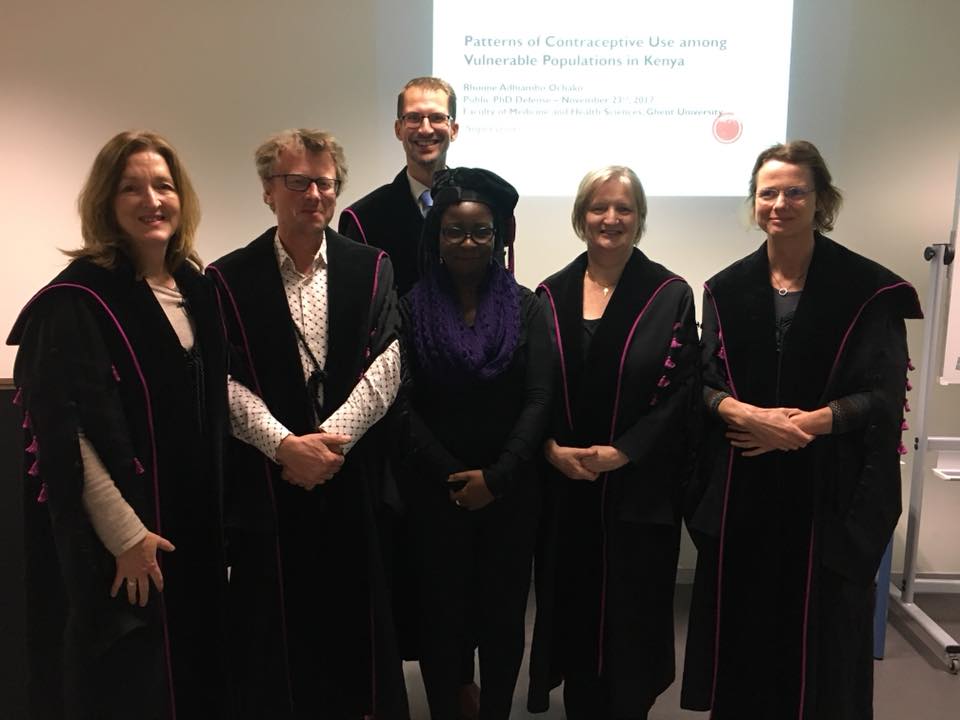 Rhoune Ochako defended her PhD thesis on 23 November 2017 at Ghent University, Belgium. Rhoune Ochako defended her PhD thesis on 23 November 2017 at Ghent University, Belgium.The title of the thesis is ‘Patterns of Contraceptive Use among Vulnerable Populations in Kenya’, and supervisors were Prof. dr. Marleen Temmerman and dr. Ian Askew. The full thesis can be downloaded from the ICRH website: http://icrhb.org/publication/icrh-monograph-rhoune-ochako-patterns-contraceptive-use-among-vulnerable-populations |
PUBLICATIONS |
| Violence and pregnancy A randomized controlled trial on the impact of a referral card-based intervention on intimate partner violence, psychosocial health, help-seeking and safety behaviour during pregnancy and postpartum. The researchers aimed to investigate the impact of a referral-based intervention in a prospective cohort of women disclosing intimate partner violence (IPV) on the prevalence of violence, and associated outcomes psychosocial health, help-seeking and safety behaviour during and after pregnancy. Women seeking antenatal care in eleven Belgian hospitals were consecutively invited from June 2010 to October 2012, to participate in a single-blind randomized controlled trial (RCT) and handed a questionnaire. Participants willing to be interviewed and reporting IPV victimisation were randomised. In the Intervention Group (IG) participants received a referral card with contact details of services providing assistance and tips to increase safety behaviour. Participants in the Control Group (CG) received a "thank you" card. Follow-up data were obtained through telephone interview at an average of 10 months after receipt of the card. At follow-up (n = 189), 66.7% of the participants reported IPV victimisation. Over the study-period, the prevalence of IPV victimisation decreased by 31.4% (P < 0.001), psychosocial health increased significantly (5.4/140, P < 0.001), 23.8% of the women sought formal help, 70.5% sought informal help, and 31.3% took at least one safety measure. However no statistically significant differences between the IG and CG were observed. Adjusted for psychosocial health at baseline, the perceived helpfulness of the referral card seemed to be larger in the IG. Both the questionnaire and the interview were perceived to be significantly more helpful than the referral card itself (P < 0.001). The authors conclude that asking questions can be helpful even for types of IPV of low severity, although simply distributing a referral card may not qualify as the ideal intervention. Future interventions should be multifaceted, delineate different types of violence, controlling for measurement reactivity and designing a tailored intervention programme adjusted to the specific needs of couples experiencing IPV. Van Parys AS, Deschepper E, Roelens K, Temmerman M, Verstraelen H. The impact of a referral card-based intervention on intimate partner violence, psychosocial health, help-seeking and safety behaviour during pregnancy and postpartum: a randomized controlled trial. BMC Pregnancy Childbirth. 2017 Oct 6;17(1):346. doi: 10.1186/s12884-017-1519-x. |
| The Global Early Adolescent Study Differences in perceived risks between girls and boys entering adolescence. This analysis is based on data from the Global Early Adolescent Study, which aims to understand the factors that predispose young people aged 10-14 years to positive or negative health trajectories. Specifically, interview transcripts from 202 adolescents and 191 parents across six diverse urban sites (Baltimore, Ghent, Nairobi, Ile Ife, Assuit and Shanghai) were analysed to compare the perceived risks associated with entering adolescence and how these risks differed by gender. Findings reveal that in all sites except Ghent, both young people and their parents perceived that girls face greater risks related to their sexual and reproductive health, and because of their sexual development, were perceived to require more protection. In contrast, when boys grow up, they and their parents recognised that their independence broadened, and parents felt that boys were strong enough to protect themselves. This has negative consequences as well, as boys were perceived to be more prone to risks associated with street violence and peer pressure. These differences in perceptions of vulnerability and related mobility are markers of a gender system that separates young women and men's roles, responsibilities and behaviours in ways that widen gender power imbalance with lifelong social and health consequences for people of both sexes. Mmari K, Moreau C, Gibbs SE, De Meyer S, Michielsen K, Kabiru CW, Bello B, Fatusi A, Lou C, Zuo X, Yu C, Al-Attar GST, El-Gibaly O. 'Yeah, I've grown; I can't go out anymore': differences in perceived risks between girls and boys entering adolescence. Cult Health Sex. 2017 Oct 18:1-12. doi: 10.1080/13691058.2017.1382718. [Epub ahead of print] |
| The Boresha project Condom failure in interactions of male and female sex workers and their clients Condom failure in sexual contacts between sex workers and their clients is common. In the context of the Boresha project, we examined the reasons why male condoms brake or slip off during commercial sex, and what actions are taken. We interviewed in-depth 25 female sex workers, 25 male sex workers and 25 clients, recruited from 18 bars/nightclubs in Mombasa, Kenya. Most participants (61/75, 81%) had experienced at least one breakage or slippage during commercial sex. Many breakages were attributed to the direct actions of clients. Breakages and slippages fell into two main groups: those that were intentionally caused by clients and unintentional ones caused by inebriation, forceful thrusting during sex and incorrect or non-lubricant use. Participant responses included: stopping sex and replacing the damaged condoms, doing nothing, getting tested for HIV, using post-exposure prophylaxis and washing. Some sex workers also employed strategies to prevent the occurrence of condom breakages. Innovative client-oriented HIV prevention and risk-reduction interventions are therefore urgently needed. Additionally, sex workers should be equipped with skills to recognize and manage breakages. Masvawure TB, Mantell JE, Tocco JU, Gichangi P, Restar A, Chabeda SV, Lafort Y, Sandfort TGM. Intentional and Unintentional Condom Breakage and Slippage in the Sexual Interactions of Female and Male Sex Workers and Clients in Mombasa, Kenya. AIDS Behav. 2017 Oct 3. doi: 10.1007/s10461-017-1922-3. [Epub ahead of print] |
| Improving postpartum care delivery and uptake in Africa A realist evaluation of the Missed Opportunities in Maternal and Infant Health (MOMI) project. Postpartum care (PPC) has remained relatively neglected in many interventions designed to improve maternal and neonatal health in sub-Saharan Africa. The Missed Opportunities in Maternal and Infant Health project developed and implemented a context-specific package of health system strengthening and demand generation in four African countries, aiming to improve access and quality of PPC. A realist evaluation was conducted to enable nuanced understanding of the influence of different contextual factors on both the implementation and impacts of the interventions. Mixed methods were used to collect data and test hypothesised context–mechanism–outcome configurations: 16 case studies (including interviews, observations, monitoring data on key healthcare processes and outcomes), monitoring data for all study health facilities and communities, document analysis and participatory evaluation workshops. After evaluation in individual countries, a cross-country analysis was conducted that led to the development of four middle-range theories. Community health workers (CHWs) were key assets in shifting demand for PPC by ‘bridging’ communities and facilities. Because they were chosen from the community they served, they gained trust from the community and an intrinsic sense of responsibility. Furthermore, if a critical mass of women seek postpartum healthcare as a result of the CHWs bridging function, a ‘buzz’ for change is created, leading eventually to the acceptability and perceived value of attending for PPC that outweighs the costs of attending the health facility. On the supply side, rigid vertical hierarchies and defined roles for health facility workers (HFWs) impede integration of maternal and infant health services. Additionally, HFWs fear being judged negatively which overrides the self-efficacy that could potentially be gained from PPC training. Instead the main driver of HFWs’ motivation to provide comprehensive PPC is dependent on accountability systems for delivering PPC created by other programmes. The realist evaluation offers insights into some of the contextual factors that can be pivotal in enabling the community-level and service-level interventions to be effective. Nehla Djellouli, Sue Mann, Bejoy Nambiar, Paula Meireles, Diana Miranda, Henrique Barros, Fadima Y Bocoum, W Maurice E Yaméogo, Clarisse Yaméogo, Sylvie Belemkoabga, Halima Tougri, Abou Coulibaly, Seni Kouanda, Vernon Mochache, Omar K Mwakusema, Eunice Irungu, Peter Gichangi, Zione Dembo, Angela Kadzakumanja, Charles Vidonji Makwenda, Judite Timóteo, Misete G Cossa, Malica de Melo, Sally Griffin, Nafissa B Osman, Severiano Foia, Emilomo Ogbe, Els Duysburgh, Tim Colbourn. Improving postpartum care delivery and uptake by implementing context-specific interventions in four countries in Africa: a realist evaluation of the Missed Opportunities in Maternal and Infant Health (MOMI) project. BMJ Glob Health 2017;2:e000408. doi:10.1136/bmjgh-2017-000408 Published 25 November 2017. |
| Post-abortion family planning in China A qualitative exploration of perceptions and experiences of contraceptive use, abortion and post-abortion family planning services (PAFP) in three provinces in China. The INPAC project aims to evaluate the effectiveness of integrated post-abortion family planning (PAFP) services into existing hospital based abortion services in China. A qualitative study was conducted in three provinces to contribute to developing effective PAFP services through understanding influences on contraceptive use, experiences of abortion and existing PAFP, and their effect on future contraceptive practices from the perspective of users, in the context of social and institutional change. Twenty-nine in-depth interviews (IDIs) were undertaken with women who had experienced abortion between 1 and 6 months prior to interview, recruited from three urban and two rural facilities in each province. Thirteen IDIs were also conducted with male partners. Six focus group discussions (FGDs) were carried out with community members from different social groups, including unmarried and married women and men, urban residents and rural-to-urban migrants. Social networks and norms are important in shaping attitudes and behaviour towards abortion and contraception. Widespread concerns were expressed about side-effects, reliability and effects on future fertility of some modern contraceptives. The combination of limited information and choices and a lack of person-centred counselling in PAFP with anxieties about side effects underlies the widespread use of unreliable methods. Gendered power relations significantly influence contraceptive (non)use, with several examples illustrating women's relative lack of power to decide on a method, particularly in the case of condoms. Although the availability of contraceptive information from respected providers can offer impetus for individual behaviour change, social distance from providers reduces opportunities for clients to discuss their difficulties regarding contraceptive use; particularly, but not exclusively for young, unmarried clients. The authors conclude that increased access to non-commercial, reliable information on contraceptive methods is needed. PAFP services must go beyond simple information provision to ensure that providers take a more person-centred approach, which considers the most appropriate method for individual clients and probes for the underlying influences on contraceptive (non)use. More sensitive reflection on gender norms and relationships is required during counselling and, where women choose this, efforts should be made to include their male partners. Specific attention to provider positionality and skills for counselling young, unmarried clients is needed. Che Y, Dusabe-Richards E, Wu S, Jiang Y, Dong X, Li J, Zhang WH, Temmerman M, Tolhurst R; INPAC group. A qualitative exploration of perceptions and experiences of contraceptive use, abortion and post-abortion family planning services (PAFP) in three provinces in China. BMC Womens Health. 2017 Nov 21;17(1):113. doi: 10.1186/s12905-017-0458-z. |
| Preterm birth Antenatal corticosteroids for women at risk of imminent preterm birth in low-resource countries: the case for equipoise and the need for efficacy trials. The scientific basis for antenatal corticosteroids (ACS) for women at risk of preterm birth has rapidly changed in recent years. Two landmark trials-the Antenatal Corticosteroid Trial and the Antenatal Late Preterm Steroids Trial-have challenged the long-held assumptions on the comparative health benefits and harms regarding the use of ACS for preterm birth across all levels of care and contexts, including resource-limited settings. Researchers, clinicians, programme managers, policymakers and donors working in low-income and middle-income countries now face challenging questions of whether, where and how ACS can be used to optimise outcomes for both women and preterm newborns. This article briefly presents an appraisal of the current evidence around ACS, how these findings informed WHO's current recommendations on ACS use, and the knowledge gaps that have emerged in the light of new trial evidence. Critical considerations in the generalisability of the available evidence demonstrate that a true state of clinical equipoise exists for this treatment option in low-resource settings. An expert group convened by WHO concluded that there is a clear need for more efficacy trials of ACS in these settings to inform clinical practice. Vogel JP, Oladapo OT, Pileggi-Castro C, Adejuyigbe EA, Althabe F, Ariff S, Ayede AI, Baqui AH, Costello A, Chikamata DM, Crowther C, Fawole B, Gibbons L, Jobe AH, Kapasa ML, Kinuthia J, Kriplani A, Kuti O, Neilson J, Patterson J, Piaggio G, Qureshi R, Qureshi Z, Sankar MJ, Stringer JSA, Temmerman M, Yunis K, Bahl R, Metin Gülmezoglu A. Antenatal corticosteroids for women at risk of imminent preterm birth in low-resource countries: the case for equipoise and the need for efficacy trials. BMJ Glob Health. 2017 Aug 30;2(3):e000398. doi: 10.1136/bmjgh-2017-000398. eCollection 2017. |
| Antenatal care in Mozambique A stepped-edge cluster randomised trial on the provision of medical supply kits to improve quality of antenatal care in Mozambique. High levels of maternal and newborn mortality and morbidity remain a daunting reality in many low-income countries. Several interventions delivered during antenatal care have been shown to improve maternal and newborn outcomes, but stockouts of medical supplies at point of care can prevent implementation of these services. The study aimed to evaluate whether a supply chain strategy based on the provision of kits could improve quality of care. A pragmatic, stepped-wedge, cluster-randomised controlled trial was conducted at ten antenatal care clinics in Mozambique. Clinics were eligible if they were not already implementing the proposed antenatal care package; they served at least 200 new pregnant women per year; they had Maternal and Child Health (MCH) nurses; and they were willing to participate. All women attending antenatal care visits at the participating clinics were included in the trial. Participating clinics were randomly assigned to shift from control to intervention on prespecified start dates. The intervention involved four components (kits with medical supplies, a cupboard to store these supplies, a tracking sheet to monitor stocks, and a one-day training session). The primary outcomes were the proportion of women screened for anaemia and proteinuria, and the proportion of women who received mebendazole in the first antenatal care visit. The intervention was delivered under routine care conditions, and analyses were done according to the intention-to-treat principle. Between March, 2014, and January, 2016, 218?277 antenatal care visits were registered, with 68,598 first and 149,679 follow-up visits. Significant improvements were found in all three primary outcomes. In first visits, 5,519 (14.6%) of 37,826 women were screened for anaemia in the control period, compared with 30,057 (97.7%) of 30,772 in the intervention period); 3,739 (9.9%) of 37,826 women were screened for proteinuria in the control period, compared with 29,874 (97.1%) of 30,772 in the intervention period; and 17,926 (51.4%) of 34,842 received mebendazole in the control period, compared with 24,960 (88.2%) of 28,294 in the intervention period. The effect was immediate and sustained over time, with negligible heterogeneity between sites. The autors conclude that a supply chain strategy that resolves stockouts at point of care can result in a vast improvement in quality during antenatal care visits, when compared with the routine national process for procurement and distribution of supplies. Betrán, A. P., Bergel, E., Griffin, S., Melo, A., Nguyen, M. H., Carbonell, A., Mondlane, S., Merialdi, M., Gulmezoglu, A.M. Provision of medical supply kits to improve quality of antenatal care in Mozambique: a stepped-wedge cluster randomised trial. The Lancet Global Health, 6(1), e57–e65. https://doi.org/10.1016/S2214-109X(17)30421-7. |
| Postpartum care delivery in Africa A realist evaluation of a project aimed at improving postpartum care delivery and uptake by implementing context-specific interventions in four countries in Africa. Postpartum care (PPC) has remained relatively neglected in many interventions designed to improve maternal and neonatal health in sub-Saharan Africa. The Missed Opportunities in Maternal and Infant Health project (MOMI) developed and implemented a context-specific package of health system strengthening and demand generation in four African countries, aiming to improve access and quality of PPC. A realist evaluation was conducted to enable nuanced understanding of the influence of different contextual factors on both the implementation and impacts of the interventions. Mixed methods were used to collect data and test hypothesised context–mechanism–outcome configurations: 16 case studies (including interviews, observations, monitoring data on key healthcare processes and outcomes), monitoring data for all study health facilities and communities, document analysis and participatory evaluation workshops. After evaluation in individual countries, a cross-country analysis was conducted that led to the development of four middle-range theories. Community health workers (CHWs) were key assets in shifting demand for PPC by ‘bridging’ communities and facilities. Because they were chosen from the community they served, they gained trust from the community and an intrinsic sense of responsibility. Furthermore, if a critical mass of women seek postpartum healthcare as a result of the CHWs bridging function, a ‘buzz’ for change is created, leading eventually to the acceptability and perceived value of attending for PPC that outweighs the costs of attending the health facility. On the supply side, rigid vertical hierarchies and defined roles for health facility workers (HFWs) impede integration of maternal and infant health services. Additionally, HFWs fear being judged negatively which overrides the self-efficacy that could potentially be gained from PPC training. Instead the main driver of HFWs’ motivation to provide comprehensive PPC is dependent on accountability systems for delivering PPC created by other programmes. The realist evaluation offers insights into some of the contextual factors that can be pivotal in enabling the community-level and service-level interventions to be effective. Djellouli, N., Mann, S., Nambiar, B., Meireles, P., Miranda, D., Barros, H., Bocoum, F.Y., Yaméogo W.M.E., Yaméogo, C., Belemkoabga, S., Tougri, H., Coulibaly, A., Kouanda, S., Mochache, V., Mwakusema, O.K., Irungu, E., Gichangi, P., Dembo, Z., Kadzakumanja, A., Makwenda, C.V., Timóteo, J., Cossa, M.G., de Melo, M., Griffin, S., Osman, N.B., Foia, S., Ogbe, E., Duysburgh, E., Colbourn, T. Improving postpartum care delivery and uptake by implementing context-specific interventions in four countries in Africa: a realist evaluation of the Missed Opportunities in Maternal and Infant Health (MOMI) project. BMJ Global Health, 2(4). http://gh.bmj.com/content/2/4/e000408.abstract |

